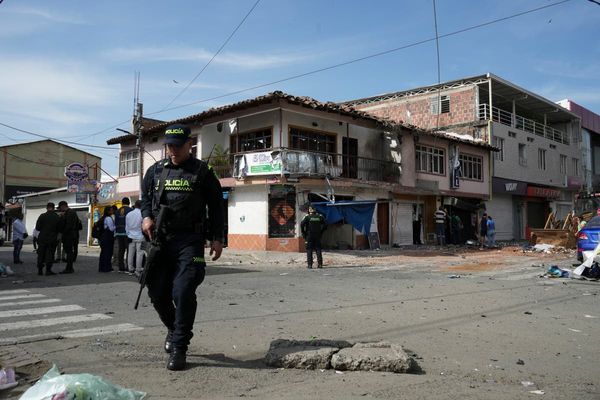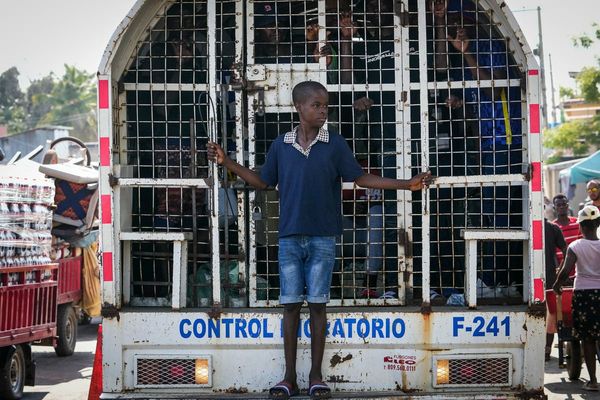
When headteacher Alan Streeter arrived at Beacon High school in Islington, north London, in 2018 the whole place felt “very tense”. Violence was a serious problem and there were 300 suspensions a year as staff wrestled to control it.
Streeter, the fifth head at the school in three years, was faced with “the most stark anti-school feeling” he had encountered in three decades working in London state schools.
“There were more children in the corridors than in the classrooms,” he says. “Parents didn’t want their kids to be here.”
Six years on, the school has an unexpected air of calm. Pupils, who come mostly from three deprived housing estates nearby, say it is no longer frightening.
But far from pushing out anyone deemed to be disruptive, Streeter has instead ushered in an era where “everyone is included”. Suspensions last year were down to 25, only one child was permanently excluded and these sanctions were a last resort after staff had tried everything else first.
The school is not alone in embracing this philosophy. This month, London’s violence reduction unit (VRU), set up by mayor Sadiq Khan, announced a new inclusion charter, asking schools across the capital to stem the rising tide of fixed-term and permanent exclusions.
There is a clear correlation between children with a history of suspension or exclusion and violence.
Lib Peck, the VRU’s director, says kids out of school are twice as likely to carry a knife. “They might get caught up in a gang or exploitation. They might just think a knife will make them safer. We know it will put them more at risk.”
There is also evidence that children excluded from school are more likely to commit crimes when they are adults. One in every two people in prison were excluded as children, according to research by the Institute for Public Policy Research thinktank.
The attempt to drive down exclusions has some fierce detractors. They include the government’s own behaviour tsar for England, Tom Bennett, a vocal supporter of tough discipline and silent corridors.
Last summer, he wrote in the Spectator about Khan wanting to reduce exclusions, announcing: “London’s schools are about to become less safe.”
Streeter is quick to point out that his school was far less safe when suspensions were really high. He describes Bennett’s comments as “the sort of unevidenced thing you hear from people who haven’t actually spent time teaching in schools”.
Streeter is adamant that he is not “soft” on discipline, and fully expects young people to follow the rules. On a tour of the school, he frequently stops teenagers with a “Blazer on!” or: “Where are you supposed to be?”
In the pastoral wing, four young people sent out of class for up to three days are in the “refocus” room. Such rooms are common in “zero tolerance” schools where suspensions and exclusions are often very high.
In some of the strictest academy chains, as pupils scale what is known as the “behaviour ladder”, notching up detentions leads to time in an isolation room, where they sit in a booth facing the wall all day as they work or perform tasks such as copying out dictionary definitions in complete silence.
Beacon High’s room is deliberately jollier and less punitive. The walls are crowded with colourful artwork. There are booths where pupils complete work they should be doing in class, but this morning they are sitting at a table in the middle discussing a book that Amanda O’Connor, the room’s coordinator, is reading to them. The book is Holes, a comic novel about a bleak children’s correctional boot camp in the Texas desert.
Two boys sheepishly admit they were sent here for fighting. One girl grabbed a teacher’s arm. O’Connor chips in: “We don’t grab you, you don’t grab us – you know that.”
They all agree they do not want to end up here again soon, “because it’s so boring”. They want to be back in the playground hanging out with their friends.
One accusation thrown at anti-exclusion policies is that they spoil everything for the kids who are not disruptive and want to learn. But GCSE results at the school have been steadily climbing from what Streeter calls “absolutely atrocious” in 2017 to just below national average now (he thinks they will hit that milestone in a year).
This matters to him, but he is also frustrated that no one is judging his pupils by how far they have travelled personally. A quarter of them have special educational needs, which is unusually high.
Streeter says some leave primary school so far behind that it is a big achievement when they manage to net a 3 (the equivalent of a D in the former grading system) at GCSE. “The system tells them they have failed and that hurts,” he says. “We have to make sure they are successful in other ways.”
For many, this will mean learning the social skills they need just as much as GCSE passes, he says. Pupils who will not cope with complete GCSE courses can learn horticulture.
Beacon High has a garden on its roof, built as a memorial to Ben Kinsella, a 16-year-old pupil at the school, who was stabbed to death by teenagers in 2008. When Streeter arrived, this “peace garden” was derelict and forgotten. Now it is thriving again and chickens wander between the beds.
“Often, poor behaviour is a child saying: ‘Notice me, help me,’” Streeter says. When his staff did trauma-informed education training, they learned that a quarter of young people have experienced trauma. Streeter thinks at his school it is three-quarters.
About 70% of his pupils are on free school meals, compared with a national average in England of almost 24%. Many depend on food banks.
The school recently set up a crowdfunding page to raise £3,000 for uniforms, because so many pupils could not afford them. Large numbers of families are refugees and asylum seekerscrammed into temporary rooms in hotels.
Streeter quotes US educationist Rita Pierson: “I was somebody when I came here, I will be a better somebody when I leave.” Children here, he says, need a champion. “Parents are champions of course but they’ve got a lot going on –and many are struggling.”
Outside in the playground, a young man is playing football with a small group of boys. He is the school’s full-time “Becoming a Man” mentor, funded by the Mental Health Foundation charity. It is a space to talk about their emotions and he helps them focus on who they want to be.
With its finances as desperately stretched as everyone else’s, the school has tapped into every charitable pot it can find to support pupils’ needs and bring in expertise.
Kash, who is in year 9 and used to get in trouble a lot, says he and his mentor would set goals for the week and discuss how to get things “back on track” when it went wrong. “I felt I could talk to her, 100%,” he says. “It was nice, feeling like someone was listening.”
Kain, in year 11, thinks the school has helped him to grow up. He used to bunk off lessons a lot and get into fights, but the school signed him up for a programme that rewarded good behaviour with boxing training each week. It changed his attitude.
“Teachers can be your friend here,” he explains. “It’s not just having someone to talk to when you’re worried, it’s telling them something you’re excited about too.”
He stresses how different the school is now. “It used to be a disaster. Behaviour was bad. It was messy.”
Lily, another year 11 pupil, adds: “It’s safe now. I don’t ever feel scared. And there’s always someone you can talk to.”
“They put a lot in place for us,” her friend Keira agrees. “If they just kick you out of school, people carry on misbehaving. But here they give people a chance to fix their ways.”






